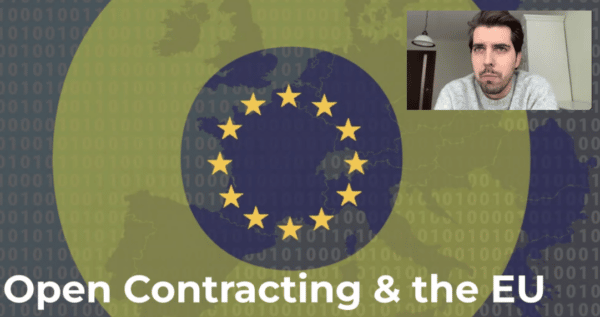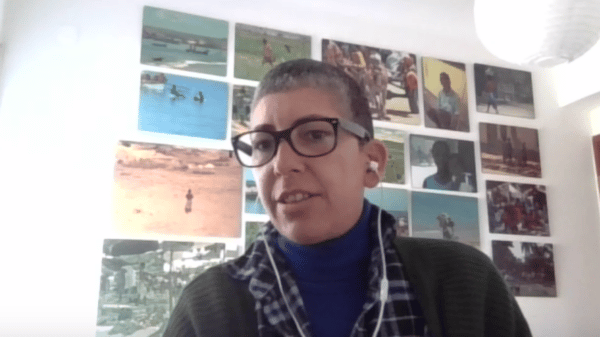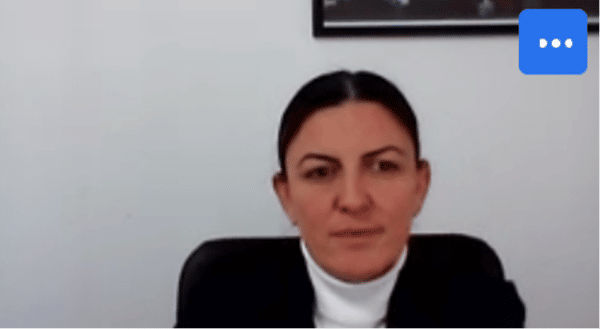21 December 2022 –
Public procurement has always been a highly corruption-prone area. With over a third of our members and affiliated groups in the UNCAC Coalition Europe network already working on or interested in public procurement, we dedicated the 5th and last regional meeting of the year to this topic. On December 15th, around 17 participants from the Europe network explored the current obstacles to achieving a paradigm shift towards clean, transparent and inclusive public procurement systems. Based on regional and national examples, we examined several ways through which anti-corruption organizations are monitoring and bringing about solutions for greater openness in public procurement.
While the UNCAC lacks a holistic approach, we call for transparency in public procurement in practice
By emphasizing the principles of transparency, competition and objectivity that underpin public procurement, the United Nations Convention against Corruption (UNCAC) sets the basis for fair bidding and contract awarding rules (article 9) but overlooks implementation. Overall, our legal and institutional frameworks fall short on tools to identify and manage integrity and other risks that can emerge in any phase of the procurement cycle. This is the reason why, especially at critical times, public procurement requires a holistic approach to ensure full transparency of government contracting throughout the entire procurement cycle.
In Europe and elsewhere, we can acknowledge a trend towards greater transparency with governments making documentation on budgets, tenders and contracts publicly available. But although more information is available on tenders and awards, there is an important need for data regarding the implementation of contracts and the overall impact of public procurement. Furthermore, corruption risks in this area have aggravated since the Covid-19 pandemic in 2020 as governments resorted to emergency procedures, a practice that compromises transparency and control over sheer volumes of public funds.
Beyond technological progress opening the door to electronic procurement systems, improvements in accountability and transparency are first and foremost the result of political commitments (such as those made through the Open Government Partnership, OGP) and are inspired by civil society’s advocacy and initiatives calling for an open policy. The ProZorro system, which made Ukraine stand out among the top performers in public procurement transparency, was started by civil society and was later taken over by the government. Currently, several organizations across Europe are monitoring public contracting (like this study on emergency contracts in Spain by Civio which revealed that very few companies had benefited from public procurement contracts during the Covid pandemic), flagging risks and proposing ad hoc solutions or entire system changes.
Reforms in the European Union’s publication rules open a window of opportunity
 The first guest speaker, Karolis Granickas, Head of Europe at Open Contracting Partnership (OCP), presented the organization’s proposals for more transparent public procurement procedures in the post-pandemic scenario in the European Union (EU). OCP is behind the Open Contracting Data Standard (OCDS), which defines a common data model to enable disclosure of open, accessible and timely information on public contracting at all stages of the cycle. The model proposed by OCDS is increasingly used worldwide.
The first guest speaker, Karolis Granickas, Head of Europe at Open Contracting Partnership (OCP), presented the organization’s proposals for more transparent public procurement procedures in the post-pandemic scenario in the European Union (EU). OCP is behind the Open Contracting Data Standard (OCDS), which defines a common data model to enable disclosure of open, accessible and timely information on public contracting at all stages of the cycle. The model proposed by OCDS is increasingly used worldwide.
There is much progress to be made on data disclosure in the region. Recently, OCP has focused on establishing principles and concrete recommendations for a sound recovery from the pandemic, through the use of the European Union’s recovery funds. EU-level reforms have the biggest impact and present the biggest opportunities, but work at national level is important as it is where reforms are implemented. Therefore, OCP provides recommendations to governments on what to publish in open data formats, setting up milestones and targets and taking into account the final recipients.
On current developments, Karolis recalled that the European Union is reforming the collection and exchange of information about procurement procedures. This information exchange concerns public contracts that fall under EU procurement rules and translates into publication of notices in the Tenders Electronic Daily (TED). Now the European Commission is promoting a new open data standardized form (eForms) to be used in TED, with the aim to improve the availability and quality of procurement data across the Union. The format will become mandatory by October 2023 and until then, it is being implemented on a voluntary basis. However, eForms are not to be applied as such, but have to be adapted by each EU Member State. This leaves a window of opportunity of several months to work on the quality of reforms. At the country level, decision-makers and stakeholders must jointly define the national approach to the various aspects of eForms, including their use with lower thresholds, establish a governance system and implement eForms into the national electronic procurement framework. As Karolis highlighted, it is vital to get these decisions right as they will impact the public purchase of goods, services and works for decades to come.
Finally, another area OCP is focusing on is the Open Data Directive, which entered into force in 2019. To implement the Open Data Directive, the European Commission is preparing the initial list of so-called “high-value datasets”, whose publication will have to be ensured free of charge and in machine-readable formats that facilitate their re-use. Including public procurement data on the list, and going beyond the minimum requirements at national level in terms of selecting datasets of particularly high value would have a positive impact on transparency. Therefore, Karolis concluded that it is a crucial moment to reflect on public procurement as a community, as we face the task of defining expectations and creating a new procurement architecture in every EU country. In that sense, OCP has joined forces with other civil society organizations and specialists to create the Open Spending EU Coalition. The initiative collects data on public procurement resilience and spending and targets particularly the European Commission, at the center of EU decision-making. He invited participants to join in and push for transparency in public procurement, especially at the country level.
Empowering the people for clean contracting in Portugal
 As members of the Open Spending EU Coalition, Transparência e Integridade are heavily advocating for more data on public procurement in Portugal. However, Karina Carvalho, Executive Director of the Portuguese Chapter of Transparency International, highlighted that people are even more important than data. There is considerable work to be done by civil society in order to get data, monitor public contracts and improve open contracting practices.
As members of the Open Spending EU Coalition, Transparência e Integridade are heavily advocating for more data on public procurement in Portugal. However, Karina Carvalho, Executive Director of the Portuguese Chapter of Transparency International, highlighted that people are even more important than data. There is considerable work to be done by civil society in order to get data, monitor public contracts and improve open contracting practices.
Karina reported that levels of trust in public spending are especially low in Portugal and perceived corruption is extremely high –more than 85% of people believe that corruption exists in public institutions and 65% believe that political connections are key to success in business-. Populist party deputies are now the 3rd largest force in Parliament, also attesting the eroding levels of public trust. While the government has recently approved the first national anticorruption strategy and advanced electronic governance, public procurement transparency and integrity standards continue to be weak.
However, as funds coming from the EU are spent via public procurement, transparency in this domain is crucial to foster sustainable public growth and to mitigate social inequalities. It is also vital to a business sector overwhelmingly composed of small businesses who rely on contracts with municipalities and public institutions. Stemming from EU directives, the Public Procurement Code is the main tool used to deal with corruption in the sector. Direct awards started to be used for contracts under 50,000 EUR in 2017. In 2021, changes to the Code normalized emergency procurement rules. New changes were introduced in 2022, enabling contracting authorities to use direct awards in more cases and in larger contracts. These changes in the Code went ahead despite warnings from organizations like TI Portugal, as a broad consensus in Parliament agreed that they were important in order to speed up the spending of EU funds in the country.
In a context with a widespread lack of trust in the proper functioning of public procurement rules and in the context of the EU recovery funds, civil society empowerment and participation are key. This can be achieved at different levels and Karina provided an overview of the initiatives and tools her organization is involved in:
- Integrity pacts – which are listed in the anti-corruption strategy;
- Data visualization dashboards;
- Making and monitoring specific commitments within OGP national action plans;
- Strengthening access to information legislation in practice;
- Working with academia to develop corruption risk indicators;
- Assisting investigative journalists;
- Engaging with experts such as the EU Open Spending Coalition;
- Protecting whistleblowers through established and effective provisions at the country level.
Early engagement and cooperation to identify corruption risks in public procurement in Kosovo
 In that same line, Diana Metushi – Krasniqi, Project Manager and Senior Researcher at Kosova Democratic Institute (Transparency International Kosovo), believes that we have to take the approach of preventing and mitigating rather than curing corruption in public procurement. A study from 2020 measuring whether and how procurement practices differ from laws (looking at transparency, competition, limits to exclusion and integrity of contracts) showed that low-income countries might have good regulation but deficiencies in practice, and the opposite happens in high-income countries. As happens elsewhere, public procurement in Kosovo is perceived only as “sourcing activity” with a focus on supplier selection and the tendering process until the contract is awarded, leaving out the phases of pre-solicitation of the service and post award implementation, where the biggest problems occur. These areas are not addressed by the law but require cooperation between governments to complete the procurement cycle.
In that same line, Diana Metushi – Krasniqi, Project Manager and Senior Researcher at Kosova Democratic Institute (Transparency International Kosovo), believes that we have to take the approach of preventing and mitigating rather than curing corruption in public procurement. A study from 2020 measuring whether and how procurement practices differ from laws (looking at transparency, competition, limits to exclusion and integrity of contracts) showed that low-income countries might have good regulation but deficiencies in practice, and the opposite happens in high-income countries. As happens elsewhere, public procurement in Kosovo is perceived only as “sourcing activity” with a focus on supplier selection and the tendering process until the contract is awarded, leaving out the phases of pre-solicitation of the service and post award implementation, where the biggest problems occur. These areas are not addressed by the law but require cooperation between governments to complete the procurement cycle.
As a result, corruption in public procurement greatly affects public works and big construction sites. For instance, the projects to construct the highways Pristina-Skopje, Pristina-Peja, Pristina-Gjilan and the road Gjakova-Dollc, all show common problems such as considerable delays and costs largely surpassing the initial value of the contract. The reasons are negligence and inefficiencies, corruption affairs and a lack of cooperation between ministries in charge. In one case, the gravel used by the company was illegally mined from a river, resulting in numerous floods in nearby villages over the course of three years. The government paid the company for the illegally extracted gravel but has never compensated the damages caused to properties, livestock and agriculture businesses. The impact on citizens of corruption in public procurement is immense, including but not only in economic terms.
Organizations such as the Kosova Democratic Institute carry out extensive monitoring of these problematic public contracts and use their findings to raise red flags, back up complaints and inform the prosecutor’s office to help build legal cases. For example, in relation to the highway “Arbën Xhaferi” between Pristina and Skopje to connect Kosovo with North Macedonia, recent criminal charges raised against the former minister of infrastructure and two additional minister’s councils were based on their research over the period 2018 – 2022. From their experience, the organization’s technical and legal expertise were crucial, but the hardest part was to find high integrity and willing prosecutors and to establish lines of cooperation with them.
Diana concluded by recommending a proper planning and preparation of contracts including integrity plans, and by enhancing cooperation between specialized non-governmental organizations and the judiciary around public procurement.
The time to incorporate transparency and accountability in public procurement is now
An interesting debate followed around our role as civil society organizations to mainstream tools and approaches and to cooperate with institutions. We are facing a critical opportunity to embed transparency in our public procurement systems and to ensure that accountability takes center stage. The credibility of the European institutions and the very essence of the European Union project are at stake.
A few ideas were put forward for willing organizations to act upon:
- Use access to information requests to complement the information available on public procurement on a case-by-case basis.
- Connect with competition authorities at national and EU-level. In some countries, anti-competitive practices are already being included in public procurement and national competition authorities are good at preventing corruption, specifically in relation to collusion.
- Advocate for the inclusion of political integrity and asset and conflict of interest declarations in public procurement regulation.
- Link beneficial ownership transparency and public procurement, and request that information on beneficial owners is made public for companies involved in public procurement.
- Take a proactive approach and find allies in the private sector to increase transparency of private registries of companies and especially involve small businesses, which make up the majority of businesses.
- Collaborate with like-minded officials and institutions, especially at the local level.
As a conclusion, the power of the people was a recurring theme for speakers and participants as it can lead us to reforms in legislation and in practice for better transparency in public procurement. Available data in open formats is important, but people make the changes at the end of the day, so we have to bring public procurement closer to citizens.
If you are a civil society activist from Europe and would like to become involved, please contact our Regional Coordinator Ana Revuelta Alonso at ana.revuelta@uncaccoalition.org.



